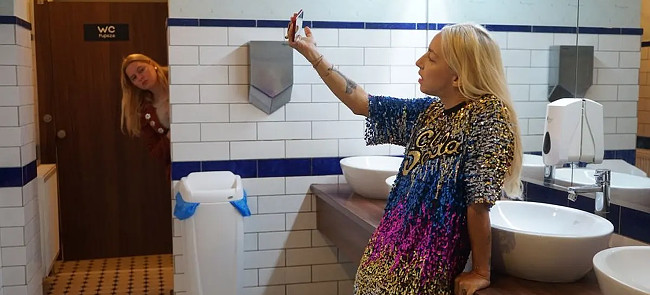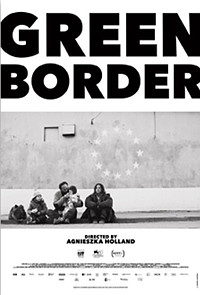| SHADOWS ON THE WALL | REVIEWS | NEWS | FESTIVAL | AWARDS | Q&A | ABOUT | TALKBACK | |||||||||||||||||||||
 Shadows off the beaten path Shadows off the beaten pathIndies, foreign, docs and shorts...
On this page:
DO NOT EXPECT TOO MUCH FROM THE END OF THE WORLD |
THE GOLDFINGER |
GREEN BORDER
| |||||||||||||||||||||
| See also: SHADOWS FILM FESTIVAL | Last update 31.Dec.23 | |||||||||||||||||||||
|
Do Not Expect Too Much From the End of the World Nu Astepta Prea Mult de la Sfârsitul Lumii Review by Rich Cline | 
| |||||||||||||||||||||
 dir-scr Radu Jude prd Ada Solomon, Adrian Sitaru with Ilinca Manolache, Ovidiu Pirsan, Nina Hoss, Dorina Lazar, Laszlo Miske, Katia Pascariu, Sofia Nicolaescu, Costel Lepadatu, Mariana Feraru, Ciprian Anton, Alex Dascalu, Uwe Boll release Rom 27.Oct.23, US Oct.23 nyiff, UK 8.Mar.24 23/Romania 2h43 TORONTO FILM FEST   Is it streaming? |
 Playfully incorporating scenes from the 1981 film Angela Moves On, plus scandal-stirring TikTok videos, this Romanian odyssey is another collage of big ideas from filmmaker Radu Jude (see also Bad Luck Banging or Loony Porn). It's bracingly original, sharp and hilarious as it deliberately provokes the viewer with enormous themes and an extreme running time. It may be messy, loud and relentless, but this film is also exhilarating. While filming intentionally shocking social media videos in the guise of her filtered misogynistic alter-ego Bobita, production assistant Angela (Manolanche) is driving around Bucharest casting disabled people in a work safety video for a multinational corporation. Overworked and underpaid, Angela's very busy day also includes a visit to the set of filmmaker Uwe Boll's nutty monster movie. Later, the video shoot begins with injured worker Ovidiu (Pirsan) and his family. But there are all kinds of issues raised that need to be taken care of so the company can present itself in the best light. Mixing colour with grainy black and white, the film features rapid-pace dialog that's packed with witty commentary, including jagged barbs and amusing malapropisms. When Angela complains that she can't get enough sleep after working 18-hour days, her boss tells her to drink more coffee. There are running comments on how artists have died throughout history, and a brutal production meeting in which the company's chief executive (Hoss) discusses whose disability is more acceptable for the video, and who better promotes family values and inclusivity. Played with almost unnerving authenticity by Manolache, Angela is a fiery character whose ruthless honesty is refreshing, even when it's abrasive or aggressive. While driving around town chewing bubblegum, she interviews injured employees, fields demanding phone calls and collects the executive at the airport. In between, she makes inflammatory videos gleefully spouting vile sexist and racist attitudes. It's a demanding role that Manolache plays with an offhanded documentary-style realism. Meanwhile, Lazar and Miske appear in 40-year-old scenes echoing Angela's present day. Casual comments abound referring to the profiteering of mega-companies at the expense of normal people while trashing the planet and blaming the poor for the world's problems. As he throws virtually everything at the screen, Jude finds some superbly complex things to say about the nature of everyday work in today's vicious economic reality. Indeed, this film is a staggering litany of the injustices we live with in modern society.
| ||||||||||||||||||||
|
The Goldfinger Review by Rich Cline | 
Is it streaming?
|  Lavishly produced and ambitious in scope, this dramatic Hong Kong thriller reunites screen icons Tony Leung and Andy Lau. Their charisma effortlessly holds the attention, even if the film itself gets lost in its financial details. Writer-director Felix Chong livens things up by echoing the entertaining stylings of The Wolf of Wall Street, but because he focusses on the business rather than the characters, it remains a bit academic. In the mid-1970s, fast-talker Ching (Leung) arrives in Hong Kong and begins accumulating wealth using dodgy stock-trading scams. His partners are KK (Yam), a member of an established family, and Carmen (Choi), a quick-thinking assistant. By the early 1980s, their lavishly blingy lifestyle has caught the attention of anti-corruption officer Lau (Lau), who becomes determined to stop this cowboy economy. But Lau is unable to take down Ching's growing empire, which has become a global powerhouse outside the law. Over the next decade, Lau tenaciously investigates Ching, locking up his cohorts and seizing assets. Following the money, the film's narrative continually emphasises percentages and numbers while the characters and their intriguing inter-relationships remain unexplored in the background. This makes it very difficult to engage with the movie, even with the gorgeous production values and a superbly invested cast. Along the way, there are several plot flourishes that catch the attention, arriving with whizzy visual touches and outrageously messy situations, especially as the case spirals out to encompass wider conspiracies and even murder. Leung and Lau adeptly deploy their powerful on-screen presence, and their thrilling chemistry too, keeping the audience gripped even if we're unsure what's up. Leung has a lot of fun as Ching, who starts out as an insecure opportunist then builds himself up to a fabulous swagger, a very rich man who feels untouchable. By contrast, Lau provides steely tenacity that's fuelled by a sympathetic straight-arrow earnestness. As in their classic Infernal Affairs films (which Chong cowrote), they are riveting nemeses, and are well-supported by the lively surrounding ensemble. Because Chong takes such an ambitious approach, there are plenty of sequences that carry a proper wallop, including sudden twists, riotous comedy and shocking violence. And the recreation of the 1970s and 80s is impressive, fully immersing the audience in this wild and woolly financial world, which pushed Hong Kong's economy to the brink even as China and the UK were negotiating about the city's future. So this is a film we watch with admiration, but it would be even more fun to experience it viscerally.
|
| Green Border Zielona Granica Review by Rich Cline |  MUST
MUST  SEE SEE
|  dir Agnieszka Holland scr Maciej Pisuk, Gabriela Lazarkiewicz, Agnieszka Holland prd Marcin Wierzchoslawski, Fred Bernstein, Agnieszka Holland with Jalal Altawil, Maja Ostaszewska, Behi Djanati Atai, Tomasz Wlosok, Mohamad Al Rashi, Dalia Naous, Jasmina Polak, Monika Frajczyk, Malwina Buss, Agata Kulesza, Taim Ajjan, Talia Ajjan release Pol 22.Sep.23, US/UK 21.Jun.24 23/Poland 2h27 VENICE FILM FEST TORONTO FILM FEST  Is it streaming?
|  Courting controversy with her home country's harsh right-wing government, Polish master-filmmaker Agnieszka Holland tells the harrowing story of an imperiled family that encounters unthinkable hatred as they seek refuge in the so-called civilised world. A documentary-style thriller, this important film draws attention to the fragile and very real people at the centre of the so-called "immigration crisis". And it unflinchingly depicts both unspeakable inhumanity and the power of compassion. In late 2021, a Syrian family fearing for their lives flies to Belarus on the promise that they can cross into Poland. But Amina and Bashir (Naous and Altawil), their young children, Bashir's father (Rashi) and Afghan refugee Leila (Atai), become lost in a dense forest, chased back and forth across the border. Some people are friendly, but Polish and Belarusian officials are relentlessly cruel and opportunistic. Meanwhile, border guard Jan (Wlosok) is building a home with his pregnant wife (Buss). And psychiatrist Julia (Ostaszewska) joins sibling activists (Polak and Frajczyk) to help the refugees. Colour drains from the film in the opening shot of the vast wooded countryside, which becomes a menacing no man's land. What was promised by Belarus' President Lukashenko as a path to freedom is actually a vicious trap, using real families lives to antagonise the European Union. And the violence border guards inflict on these people, including small children and crying infants, is unthinkable. Tomek Naumiuk's cinematography is simply stunning, setting the scene vividly while catching terrific human detail. The characters are strikingly realistic, layered with complex personalities and interrelationships. Wlosok's Jan is an especially conflicted character, struggling to suppress his conscience as he faces one atrocity after another. Ostaszewska's Julia also has a powerful journey. Meanwhile, the ensemble cast playing asylum seekers at the centre of the film are astonishingly natural, revealing their optimism in the middle of a nightmare. Many speak about how they know they will be killed if they are sent home; they just want a chance to live. Unnervingly timely and staggeringly urgent, it's easy to see why right-wing governments don't like this film. Especially in Poland, where racism and xenophobia have been ingrained in the system, dismissing desperate people as weapons sent by Putin and Lukashenko. This dehumanisation is horrifying, especially as it echoes mainstream views across the Western world. And an epilogue set just after Russia's invasion of Ukraine offers a stunning counterpoint.
| 
See also: SHADOWS FILM FESTIVAL © 2023 by Rich Cline, Shadows
on the Wall
HOME | REVIEWS | NEWS | FESTIVAL | AWARDS
| Q&A | ABOUT | TALKBACK | | ||||||||||||||



